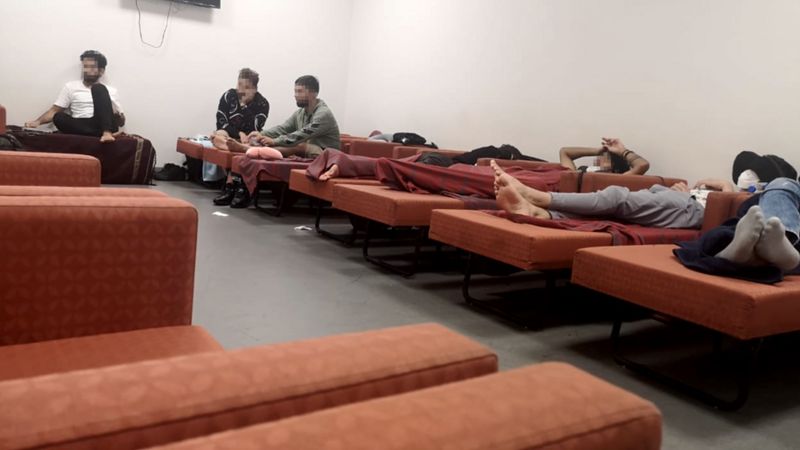An extended family of 16 fleeing from the Taliban-occupied city of Herat in Afghanistan has been stranded at İstanbul Airport for nearly a month and is at risk of deportation despite applying for international protection, the Stockholm Center for Freedom reported, citing BBC Turkish service.
Members of the family said if they were to be sent back to Afghanistan, their lives would be in danger. The asylum seekers said their applications for protection were never forwarded to the proper agency and that they fear Turkish authorities are making them wait at the airport for deportation.
One man identified as Ahmed said he worked for an American company before he fled Afghanistan and that one member of the family was killed by the Taliban. The incident prompted him to leave the country, and he said he was now in even more danger because the Taliban were aware they were on the run.
“There is no way we can return to Afghanistan,” he said. “We are marked people, and if Turkey sends us back we will almost certainly be killed.”
Turkey maintains a geographical limitation to the 1951 Refugee Convention and only applies it to individuals originating from European countries.
In April 2013 Turkey adopted a comprehensive, EU-inspired Law on Foreigners and International Protection. According to this law, Turkey has obligations towards all persons in need of protection, regardless of country origin, but the geographical limitation continues to exist, meaning an applicant can be granted refugee status only if s/he is coming from a European country.
Non-Europeans are registered as international protection applicants. The applications are processed by Turkey’s Directorate General of Migration Management (DGMM). If asylum seekers come in contact with security officers, then their application is sent to the DGMM by the officers.
According to the BBC the DGMM told them that they had not received any information about the family, and the authorities from İstanbul Airport denied requests for an interview.
Ahmed said there were sick and old family members as well as an 18-month-old baby and that the conditions in the airport were not suitable for a long stay. “The baby and seniors need urgent medical attention,” he said.
According to Ahmed, they lacked baby formula, blankets and other basic needs. “No-body asked us if we were hungry or had water,” he said. “We are feeding the baby sugar water because we don’t have anything else.”
After the baby became sick, paramedics came and gave them a pain killer but later agreed to take the child to the hospital after its condition took a turn for the worse. However, the other sick family members were not treated or given any medication.
A lawyer whose name was not disclosed by the BBC said Turkey was increasingly rejecting applications for international protection. Applicants had the right to appeal but were made to wait up to a year for results.
“During this period these people live in transit zones such as airports,” said the lawyer. “They are made to live in poor conditions without enough food, clean water or access to healthcare.”
Under international human rights law, the principle of non-refoulement prohibits states from transferring or removing individuals from their jurisdiction or effective control when there are substantial grounds for believing the person would be at risk of irreparable harm upon return, including persecution, torture, ill-treatment or other serious human rights violations. The principle is explicitly mentioned in the Convention against Torture and Other Cruel, Inhuman or Degrading Treatment or Punishment (CAT) and the International Convention for the Protection of All Persons from Enforced Disappearance (ICPPED).

